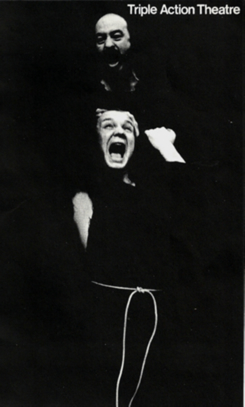
"For where we are is hell
and where hell is
There must we ever be."
Dr. Faustus is the story of an intelligent and ambitious man and his inability to accept his own limitations. It is a struggle that leads him, inevitably, to failure. The story tells us that success is an ethereal and relative value without substance or lasting achievement. In an attempt to grasp fulfillment, Faustus turns to supernatural powers.
When Marlowe took up the story, he made a vital adaptation to Faustus' demonic servants; he created Mephostophilis. Marlowe invented this name from the Greek for "Faust's other self," inferring that man and devil are one and the same. With this alteration, the legend became a psychological drama so full of complexity that it has fascinated artists and academics for 500 years. Byron and Geothe were among those who became enchanted with the theme and whose words Steven uses in this adaptation.
The first public presentation of this version of Faustus, written and directed by Steven Rumbelow, appeared in Britain in 1970. It was hailed an immediate success by both critics and the public. It toured in a developing form for a total of 14 years. The production won awards at major international festivals and was documented in several books and theses.
"It has always been a mystery to me that the traditional presentations of the play merely offer Mephistopheles as evil and Faustus as misguided purity. I have never been able to find evidence of that in Marlowe's text." - From Steven Rumbelow's Director's Notes
Review Archive
- Dr. Faustus
- King Lear
- Ulysses
- Moby Dick
- Bridal Polonaise
- Yes
- Solaris
- Richard III
- Other Notable Productions





